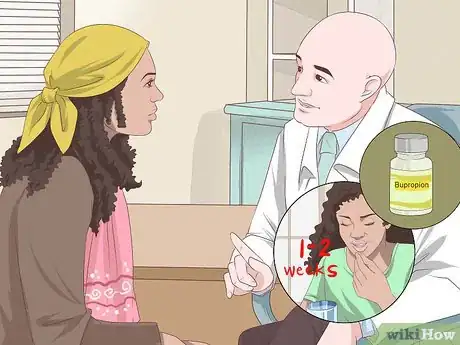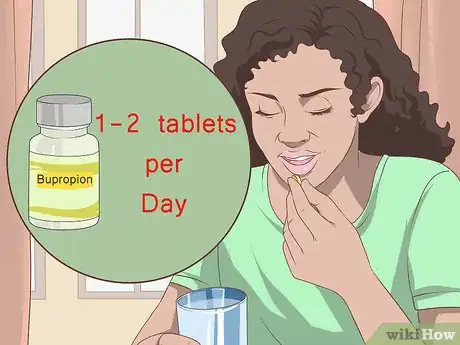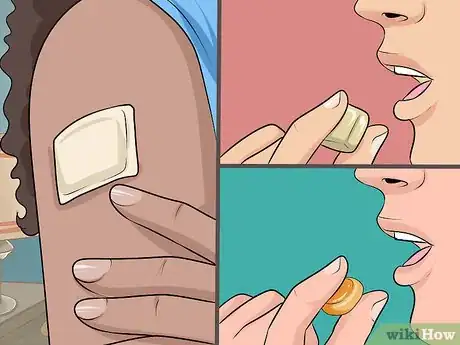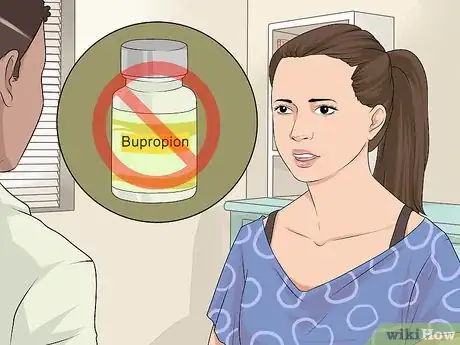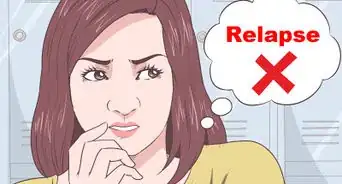This article was co-authored by Chris M. Matsko, MD. Dr. Chris M. Matsko is a retired physician based in Pittsburgh, Pennsylvania. With over 25 years of medical research experience, Dr. Matsko was awarded the Pittsburgh Cornell University Leadership Award for Excellence. He holds a BS in Nutritional Science from Cornell University and an MD from the Temple University School of Medicine in 2007. Dr. Matsko earned a Research Writing Certification from the American Medical Writers Association (AMWA) in 2016 and a Medical Writing & Editing Certification from the University of Chicago in 2017.
There are 8 references cited in this article, which can be found at the bottom of the page.
This article has been viewed 25,105 times.
Unlike nicotine patches or gum, Bupropion (also called Wellbutrin or Zyban) does not contain any nicotine, yet can help with decreasing cravings and withdrawal symptoms.[1] For this reason, it is preferred for many people wanting to quit tobacco. While there are things to consider such as side-effects and eligibility for medication, the overall benefits of bupropion appear positive in the short-term and the long-run. If you’re curious to learn about using Bupropion, speak with your prescriber and begin making a plan to quit.
Steps
Consulting with Your Physician
-
1Learn about Bupropion. Bupropion is a safe and cost-effective way to quit smoking and tobacco use.[2] It is easy to take and does not contain any nicotine. Bupropion can help with cravings and withdrawal symptoms from tobacco. It can also help reduce weight gain for some people after quitting.
- Using prescription medication should not be taken lightly, so be invested in your decision to quit smoking or using tobacco.
- Bupropion is prescribed for people over the age of 18 and is not prescribed for women who are pregnant. Bupropion is not intended for people with a history of seizures, kidney failure, excessive alcohol use, eating disorders, bipolar disorder, or serious head injuries.[3]
-
2Talk with your physician. Bupropion is a prescription medication, meaning that you must obtain it through a prescriber. Set up an appointment with your prescriber to discuss taking Bupropion. Your physician will likely ask you about your health, smoking or tobacco habits, and review any medications, supplements, or vitamins you currently take.
- You can say, “I am ready to quit tobacco, and want to know if Bupropion is a good option for me.”
- Check with your insurance to see whether medication is covered by insurance or not.[4]
- Always discuss your medical history and medications truthfully.
- Try using the START acronym to help you quit smoking. In this acronym, S = Set a quit date; T = Tell your friends and family; A = Anticipate challenges and difficulties; R = Remove all tobacco products from home, work, and car; and T = Talk to your doctor for more support and treatment.
Advertisement -
3Assess the risks. As with all prescription medications, Bupropion can have associated risks, and it’s important to discuss these with your prescriber prior to taking medication. Discuss any medications you currently take and ask if they interact with Bupropion.
- Say, “I currently take these medications. Are there any risks I should be aware of? What are my options?”
- Bupropion rarely causes seizures and can interact with antidepressants, antiarrhythmics and antipsychotics.[5]
-
4Discuss side-effects. Common side-effects of Bupropion include dry mouth and insomnia. These symptoms are also associated with withdrawal. About half of people taking Bupropion experience these side-effects.[6] Other side-effects can include headache, shakiness or nervousness, and weight loss.[7]
- Contact your prescriber if you have major difficulty with side-effects and ask how you can get relief safely. Say, “I’m experiencing some side-effects, and I’d like help managing them. Is there something I can take for insomnia? What about for the headaches?”
-
5Obtain a prescription. Once you have discussed your options and concluded alongside your physician that Bupropion is a safe medication for you, your physician will likely write you a prescription for Bupropion. Ask if you will need refills or need additional appointments. Once all of your questions have been answered, you can pick up your prescription at the pharmacy. Some physicians will write you a prescription while others may call or email a pharmacy.[8]
- Your pharmacist can help you understand any side-effects or interactions to avoid with Bupropion.
Taking Bupropion
-
1Create a plan to quit. Set a date to quit using tobacco. Keep the date realistic and not too far in the future. You may want to avoid choosing a time that is especially stressful, such as moving, starting a new job, or traveling. Creating a quit plan will help you stay on track and keep you focused.[9]
- Choose a time when you do not anticipate many stressors. Decide why you are quitting. Is it to save money, be healthier, or for your loved ones? Identify your triggers (such as stress, not getting enough sleep, fights) for and use them to fight cravings. You may also want to reward yourself for your progress, such as taking the money you’ve saved from not buying cigarettes and having a nice meal or seeing a play.
-
2Know when to start taking doses. Begin your dose of Bupropion approximately 1-2 weeks prior to quitting tobacco.[10] This will help the Bupropion build up in your system. This requires a bit of planning. Refer to your plan to quit and set the day to start medication based off of that plan.
- Discuss starting the medication with your physician and/or pharmacist.
-
3Take the proper dosage. Most people take one 150mg tablet, once or twice each day.[11] Some physicians may recommend you take one 150mg tablet in the morning for the first three days, followed by two tablets (once in the morning and once at night) for the rest of treatment.[12] Take only the dose you are prescribed. Do not change your dose without approval from your physician.
- Zyban is the sustained release formulation of wellbutrin, and its dosing will last longer. The initial dose should be for 150 mg for the first three days, and then increase to 150 mg twice daily for seven to 12 weeks. Therapy should begin at least one week before your expected quit date. If significant progress has not been made within seven weeks, then success is unlikely and treatment discontinuation should be considered.
- Medication is meant to be taken whole. Do not crush, chew, or divide tablets.
- If you feel you need to change your dose, discuss it with your physician first. Do not change your dose on your own unsupervised.
-
4Consider nicotine replacements. Bupropion can be safely used with a nicotine replacement therapy (NRT). Some common nicotine replacement products include nicotine patches, gum, and lozenges, which can be purchased over-the-counter. Nicotine inhalers and nasal sprays can be purchased once a prescription is obtained.[13] Decide on your own or with the help of your prescriber which option will work best for you.
- Some people want the nicotine out of their system while others want to lower the risk of withdrawal symptoms or reduce cravings during early use. Prior to starting Bupropion, decide which option is best for you.
-
5Notice changes in behavior. Stop taking medications immediately if you start having thoughts of suicide. If you experience changes in behavior (such as anger, agitation, aggression, or depressed mood) talk to your prescriber. He or she may tell you to stop using the medication.[14]
- If you are suicidal, seek emergency care immediately. Go to your local hospital’s emergency department or call emergency services.
-
6Decide when to stop taking Bupropion. Bupropion is recommended for 7-12 weeks, and can be taken for six months to one year.[15] [16] Discuss with your physician when to stop medication. Your physician may ask you to watch for medication withdrawal symptoms or any changes in behavior. If you withdraw medication and notice any significant changes in your body or behavior, contact your physician immediately.
References
- ↑ http://www.webmd.com/smoking-cessation/bupropion-hydrochloride-zyban-for-quitting-smoking
- ↑ http://www.ncbi.nlm.nih.gov/pmc/articles/PMC2528204/
- ↑ https://medlineplus.gov/ency/article/007439.htm
- ↑ https://www.healthcare.gov/using-marketplace-coverage/prescription-medications/
- ↑ http://www.ncbi.nlm.nih.gov/pmc/articles/PMC2528204/
- ↑ http://www.ncbi.nlm.nih.gov/pmc/articles/PMC2528204/
- ↑ https://www.quitnow.ca/quitting/medications/nicotine-bupropion
- ↑ https://medlineplus.gov/ency/article/001956.htm
- ↑ https://smokefree.gov/build-your-quit-plan
- ↑ https://medlineplus.gov/ency/article/007439.htm
- ↑ https://medlineplus.gov/ency/article/007439.htm
- ↑ https://www.quitnow.ca/quitting/medications/nicotine-bupropion
- ↑ https://smokefree.gov/explore-medications
- ↑ https://medlineplus.gov/ency/article/007439.htm
- ↑ https://www.quitnow.ca/quitting/medications/nicotine-bupropion
- ↑ https://medlineplus.gov/ency/article/007439.htm






